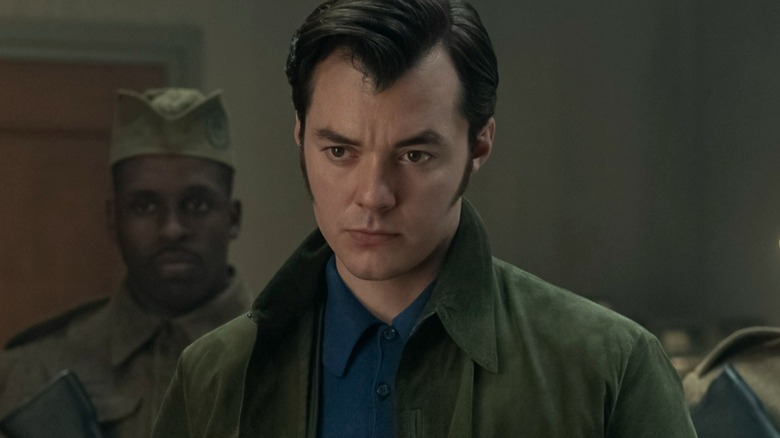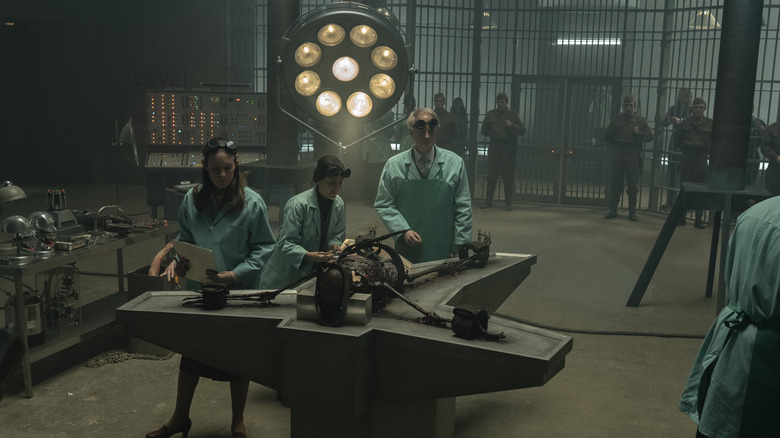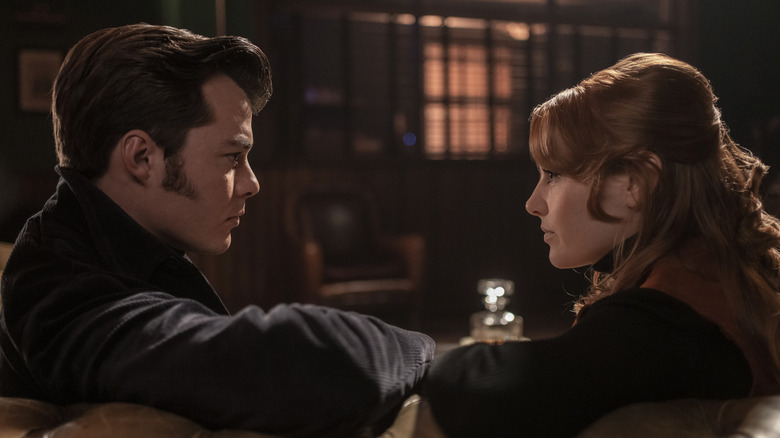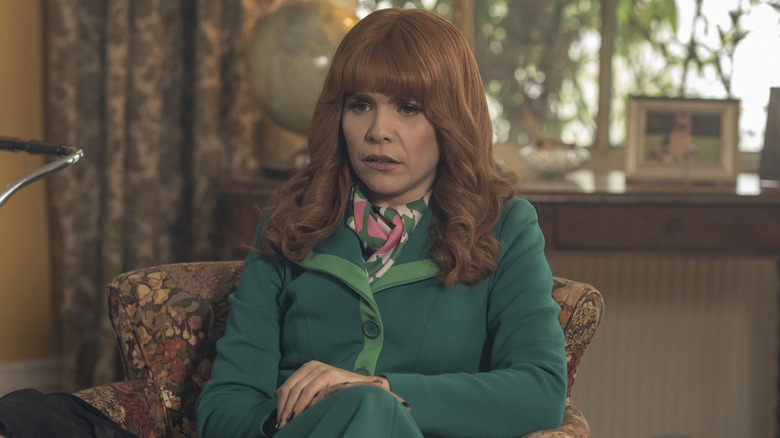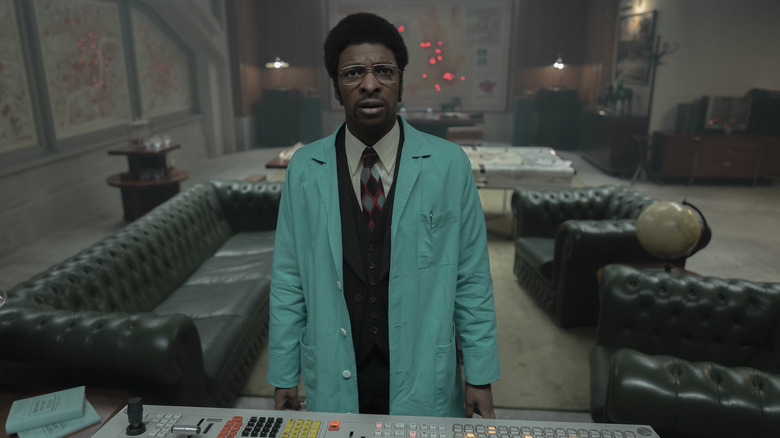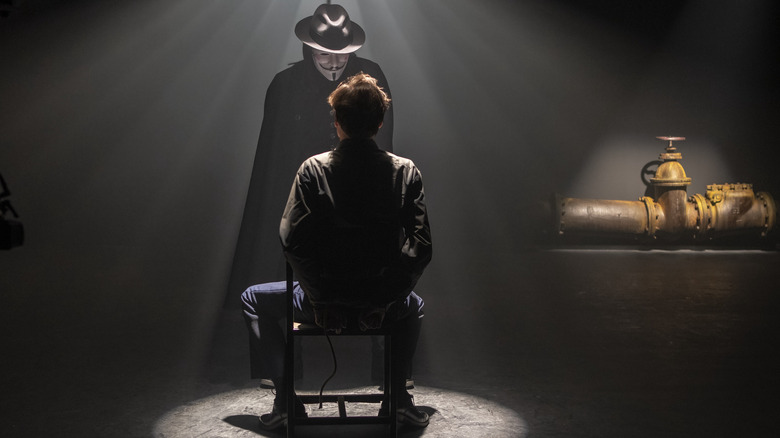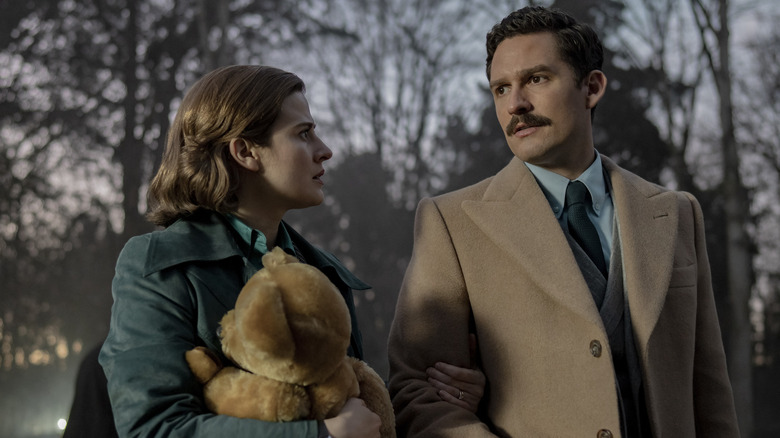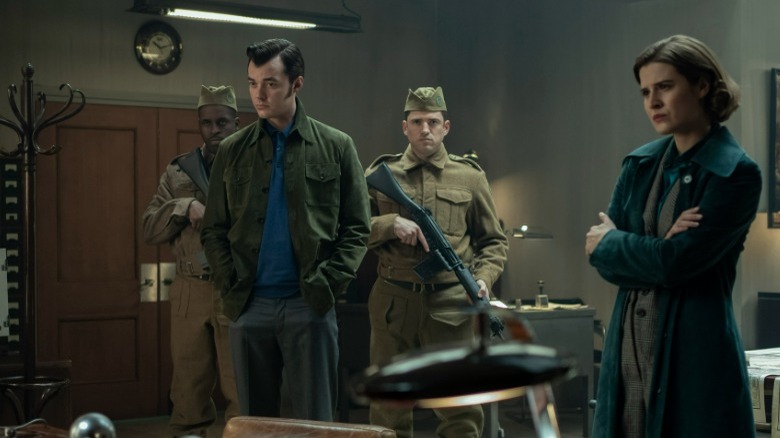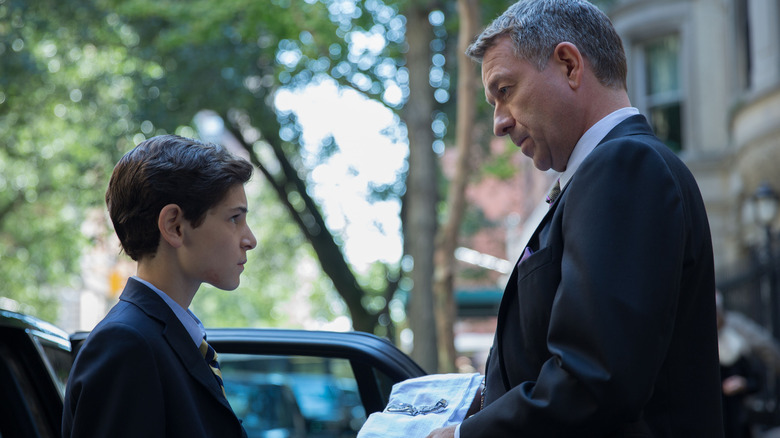The Ending Of Pennyworth Season 3 Explained
Though it was not long for this world, "Pennyworth" may very well go down in spin-off history for being one of the most consistently high-quality and admirably free-spirited comic adaptations of all time. Taking a queue from Fox's "Gotham," this show went into the past to visit an alternate-history London in the 1960s while fleshing out the early days of Thomas and Martha Wayne, as well as, you guessed it, "The Origin of Batman's Butler."
Giving a little backstory on the early days of Sean Pertwee's take on Alfred Thaddeus Crane Pennyworth, this was a show that pulled in wildly unrelated threads from the comics while rewriting British history. However, it managed to do it all with the exact level of roguishness and charm one might expect from the haunted former SAS agent turned hired hand.
The first two seasons were a wild ride, but the third outdid itself by going so far off the rails that we forgot the track even existed. Still, as bonkers as "Pennyworth" got, it did so in true action-adventure fashion and never lost sight of the man that Alfred would someday become. Solidifying his early relationship with the Waynes while showing us what his life was like before they became as close as family, "Pennyworth" always had a surprising amount of heart (and explosions). With "Pennyworth" officially canceled after airing its last episode in late November 2022, there's no time like the present to look back over that wild series finale.
The time jump
Season 2 of "Pennyworth" ended on a cliffhanger, with Mrs. Pennyworth learning her husband is still alive after turning traitor and apparently dying at the end of Season 1. Beyond that, Mr. Pennyworth shares information with Alfred after experiencing a change of heart against the fascistic Raven Union. This leads to Alfred and Gully rushing to find the Stormcloud bomb, which is under threat of imminent detonation. Recognizing that they're running out of time, Alfred and Gully try to think of ways to stop this catastrophic scenario from taking place. Gully decides to simply swallow the detonating capsule, then turns blue and apparently dies — emphasis on "apparently."
When the New Raven Union attacks London, they're thwarted by our cast of anti-fascists, joined by Gully, who now has life-draining superpowers and goes by the name Captain Blighty. The civil war draws to a close between seasons with the League as the victors, so the start of Season 3 features a time jump five years into the future.
Alfred's security company is getting bigger all the time and now includes Daveboy and Bet. Meanwhile, Lucius and Martha are working together as agents for MI5, Thomas is a doctor, and Mrs. Pennyworth is busy caring for the young Samantha Wayne. Bet's girlfriend Katie is gone, but Bet takes in a baby after killing the parents in her hunt to find Salt, the murderous man who nearly detonated Stormcloud.
The Lullaby victims
One of the stranger things to happen in Season 3 of "Pennyworth" is the revelation that Wayne Enterprises has been working with a rogue faction of the CIA to create a psychokinetic drug intended to make the people of London mentally suggestible and compliant. We're going to admit that we did not expect the Waynes to be responsible for creating their own MKUltra, but to be fair, Thomas' father Patrick was blackmailed into being involved. Further, Martha is working in secret to put a stop to the whole thing, and Thomas is absolutely horrified when he learns of the existence of Lullaby. Still, regret doesn't count for much when people are dying, and Lullaby causes a lot more problems than the Wayne family can contain.
In the first episode of Season 3, a woman named Jessica kills her parents under the influence of Lullaby, and it's up to Alfie to try and help her understand what's happened to her. This escalates throughout the season until Lullaby is leaked into the milk supply of London, causing mass hallucinations. The finale begins with Alfie and Sandra fleeing a mob of Lullaby victims out for blood, and the episode works to tell us how this came to be. It's something that has to be seen to be believed, but the end result is that a whole lot of people die, and Alfie barely gets Sandra out of London alive.
Sandra and Alfie
Anyone who was in for the long game with "Pennyworth" knows that our good man is a pretty terrible boyfriend for the most part. After losing Esme to a targeted act of violence in Season 1, Alfred falls for the singer Sandra in a big way while she works at his bar in Season 2. Naturally, this doesn't stop him from having hookups galore on the side and generally staying emotionally unavailable for Sandra. Though she rises to great heights in her career as a pop star throughout the show, Alfred doesn't appreciate her as he should, and it causes massive strain on their relationship all the way to the last episode.
Yet, that classic Pennyworth charm really works on Sandra, and she forgives him even after all the many stunts he's pulled over the last couple of seasons. After saving her from the horde, Alfred realizes the emotional toll their relationship takes on Sandra and comes to terms with the fact that he genuinely loves her. He proposes to her, and, despite the less-than-ideal circumstances, Sandra accepts.
This isn't remotely the end of their struggles in this episode, but it does offer a brief respite amid the chaotic action sequences of the finale. After his behavior this season, it's safe to say that Sandra deserves better, but it's nice to see Alfred finally take a moment to acknowledge everything they've been through together.
Bet fans snubbed
Played by multidisciplinary artist Paloma Faith, Bet Sykes was one of the breakout characters of "Pennyworth." This devoted member of the Raven Union with violent tendencies ultimately changed sides after murdering a particularly sadistic higher-up to save an art student named Katie. Though the two were involved for a time, Katie doesn't appear in Season 3. While Bet is in the middle of the action just as much as she was in the last two seasons, her character arc pretty much fizzles when she takes a backseat to the many other plot threads of the season. After being such a staple of the series, this underwhelming showing is a bit disappointing.
Still, Bet was around, and we did get some satisfying moments with her. Taking in the infant Julie in Episode 1, much of her story through the first part of the season involves her caring for the baby while continuing on her mission of finding and ending the threat of Salt. Bet sends Julie to her sister Peggy to be cared for when she realizes she's not done with her mission of revenge quite yet.
The final episode shows Bet imprisoned with Lucius. Though initially violent and mistrusting of him, the two ultimately work together and are saved by the rest of the crew. Again, this is pretty lackluster for all the major character beats Bet had in Season 2, but at least we got to say goodbye to this fan-favorite character.
Lucius' character arc
While Bet fans may not have had a lot to work with this season, anyone who loves the DCEU will be thrilled to see longtime recurring character Lucius Fox jumping into the spotlight throughout the last round of episodes of "Pennyworth." Actor Simon Manyonda did excellent work bringing the character to life, and this season sees him go from the relatively meek agent of seasons past to being a courageous go-getter. All this, of course, sets him up as the eventual tech genius of Wayne Industries and the man who almost singlehandedly stocks Batman's arsenal. Without Lucius, there would be no Batman, and this season of "Pennyworth" makes sure we know that by giving him the character arc he deserves.
In Episode 9, Lucius realizes that Persons With Enhancements (PWEs) are being held captive in an underground bunker and cruelly experimented on. He knows he has to put a stop to this and get them free, so he goes all in and unfortunately becomes imprisoned himself. Though he is eventually freed, this is a major heroic moment for Lucius, who is so often regulated to the status of being a background character in the larger comics and film franchises alike. Tapping into his established characteristics while giving him a touch of youthful enthusiasm made this take on the character click in a big way.
The V for Vendetta thread
"Pennywise" is chockfull of choices so offbeat they border on bizarre, and this is a major part of the show's charm. However, one of the most off-the-wall decisions is the choice to pull in a "V for Vendetta" subplot seemingly out of nowhere. Created by Alan Moore and David Lloyd, "V for Vendetta" is a comic about a vigilante who seeks to disrupt the fascist rule of an alternate Britain. Though it's officially a DC property, "V for Vendetta" isn't usually regarded as even being in the DCEU, with no ties to continuity except those injected long after the series' original run. For instance, like in "Pennyworth" — where V shows up completely unannounced.
Still, including the anti-fascist V in a series like "Pennyworth" makes a strange sort of sense. While V doesn't necessarily play a huge role and could have been dropped from the series without causing much of a ripple, this is a show that has been mostly bereft of Easter eggs or comic references, making this a welcome sight. Likewise, granting this character space in this universe makes Batman's existence make a little more sense, as the character popping up a few decades prior to young Bruce donning the cowl grants a heroic precursor for the vigilante.
Even without all of that reasoning away, the fact is that V is a cool character, and it's just always going to be fun to see them pop up.
The Waynes
Ah, Thomas and Martha Wayne, victims of a random act of violence in the forebodingly named Crime Alley, the tragic double murder that spurred young Bruce Wayne to dedicate his life to fighting crime. While these two are usually defined by a handful of salient words of advice and the scattering of pearls across the dirty streets of Gotham, "Pennyworth" does the seemingly impossible and brings them to life as two lovable but flawed people in love. Beyond that, the series depicts them fighting the good fight and trying to keep the world safe from the rise of fascism even as they struggle with their complicated relationship. Though far from perfect, these two fit right in on the cast of "Pennyworth."
Season 2 saw them marry and become parents to the young Samantha Wayne, destined to eventually be the long-lost sister of Bruce. This season, Thomas gets out of life as an agent and becomes a doctor, but feels betrayed when he realizes that Martha has not done the same — despite assuring him that she has. Though Thomas chafes at the idea of Martha putting herself at risk, Martha refuses to let his comfort define her, which creates massive turmoil throughout the season.
However, in the end, Martha goes to save Lucius, telling Thomas that she has to do what's right even when it's difficult, and the two are able to reconcile their differences by the end — for the most part.
Leaving London
One of the long-running subplots of "Pennyworth" is Alfred desperately wanting to leave London forever but not quite being able to do it. As much as he's wanted to get out, his British roots run deep, and so, despite his many attempts to set sail for the United States, he finds himself tied to the city his life has been built out of. In the finale, with so many things going horribly awry, he finally manages to get clear, but it's not exactly under ideal circumstances. When a mob of Lullaby victims attempts to tear him and his friends to pieces, they are forced to flee in a red double-decker bus. Never let it be said that the gang doesn't travel in style!
The Lullaby victims are terrifying, but despite being under the control of a mind-altering substance, the gang responds to them more or less as zombies and has no compunction about offing a few — quite a few, actually. The crew picks up the Waynes along their way, which is great, considering we're not totally sure what would have become of them otherwise. Alfie also brings Daveboy and his mom, Mrs. P., who had previously been disappointed and annoyed when he tried to leave the city. However, she now seems infinitely more pleased with the idea as the alternate grows increasingly grim. Frankly, we're glad they got out while the getting was good.
A (literal) bomb drop
As we've described at length, much of this season was about the crew attempting to get to the bottom of the whole Lullaby mess. Though they succeeded in figuring out what was going on, they weren't able to totally curb the catastrophic events that occurred once the general population had ingested a fair amount of the stuff. In the end, the best they've got is to get out of town and let the effects of Lullaby wear themselves out. However, by the end of the episode, we realize that even that dismal conclusion is a bit too far on the side of optimism.
With Alfred and Sandra excited to be wed, the double-decker bus pulls over on the side of the road. As they happily exchange vows, Sandra taking the time to be intentional and Alfie looking like he expects her to back out at any moment, she finally says those magical words, "I do." When Alfred is asked if he takes Sandra as his wife, he goes to speak, but the camera pans out, and we see an enormous mushroom cloud rise up over London. As everyone gazes on, struck with awe and horror, the credits roll without us ever knowing for sure if he said "I do" or not. What an ending!
From Pennyworth to Gotham
As noted, "Pennyworth" is generally considered a precursor to "Gotham," but by the end of the series, we've got way more questions than answers. The cliffhanger ending seems like a wild place to leave off, and the finale made very few (if any) attempts to join "Pennyworth" to the series it apparently spins off from. What happens to Sandra, and what happens after the bomb is dropped? All of this is going to have to be filed under the "rule of cool," where we just let go of every continuity error and question we have because, honestly, this series is awesome, and at a certain point the contradictions just don't matter anymore.
Though the continuity is truly all over the place, that shouldn't dissuade "Pennyworth" fans from seeking out "Gotham" and vice versa. The plotlines don't have to match up for these two to be incredibly fun alternate reality takes on the Batman mythos. The show nailed it where it counts, and that's the emotional thread between Jack Bannon's suave swagger and Sean Pertwee's uncertain but devoted butler, struggling to raise the son of his best friends and feeling like he's always letting them down.
In the end, "Pennyworth" and "Gotham" have one major thing in common, and it's that we could have watched another 15 seasons of either without getting bored.
